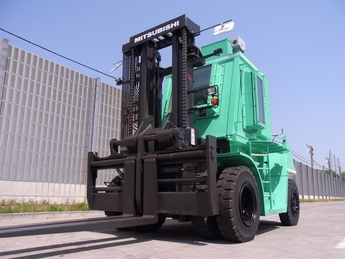Mitsubishi Heavy Industries, Ltd. (MHI) has developed a special heavy-duty forklift featuring a radiation-shielded cabin for safer handling of contaminated rubble near the Fukushima Daiichi Nuclear Power Station operated by TEPCO.

Two units of the forklift are to be delivered to a joint venture formed by Taisei Corporation, Kajima Corporation and Shimizu Corporation that is handling the contaminated rubble at the site.
The first and second units of the forklift are slated for delivery on May 2 and 20, respectively.??
The special forklifts have been developed and manufactured in a very short period of one month. During this time MHI has fully incorporated its diversified accumulated expertise - in vehicle systems, filtering, heavy plate welding, and radiation shielding and management - into the new unit based on the company's 15-ton heavy-duty forklift. The new forklift has a fully sealed cabin constructed using 100 millimeter (mm) thick steel plates and 230mm thick lead glass, with all sides welded to enable the operator to maneuver the forklift with maximum shielding against radiation. Prior to delivery, MHI will verify the radiation shield capability using the company's radiation testing facility.??
The heavy-duty forklifts are also to be equipped with special filters that remove dust and other radiation-contaminated material, thereby enabling a stable supply of purified air. The air-conditioned cabin is also pressurized by the air purifier to prevent external air from entering.??Each forklift measures 7.3 meters (m) in length, 2.5m in width and 3.9m in height, weighs 30 tons, and has a load capacity of 9,000 kilograms. The forklifts will be supplied with various attachments including hinged forks, bucket, box clamp and pivoting fork. Using these attachments, the forklift will enable efficient transfer and placement of rubble into low-level radioactive waste transfer containers. ??
Starting immediately after the earthquake, MHI dispatched engineers to help achieve quick restoration of operations at thermal power plants damaged in the quake. It has also sent emergency supplies to the disaster areas using company helicopters and airplanes. In conjunction with the Fukushima Daiichi Nuclear Power Station, MHI has cooperated in conversion work to the Mega-Float provided by Shizuoka City to TEPCO to store large volumes of contaminated water. The company pledges to continue to be involved to help recovery of the plant in future.




